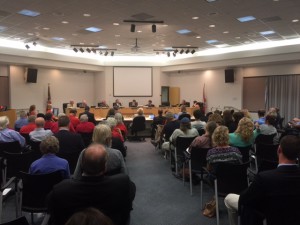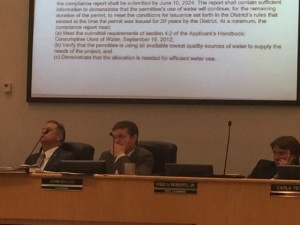
Palatka, FL – A long and costly battle over water use came to an end today when the Governing Board of the St. Johns River Water Management District voted unanimously to approve a permit modification for a large commercial cattle ranch in Marion County.
Sleepy Creek Lands (SCL) is a 25,000 acre grass-fed beef operation started by Canadian billionaire Frank Stronach on land that was formerly a sod farm and pine tree plantation. SCL’s original plan was for 30,000 head of cattle, which would make it larger than all other Marion County cattle ranches combined. Controversy erupted in 2011 when the ranch announced plans to apply for its first water withdrawal permit of 23 million gallons per day (mgd), which is more than the entire city of Ocala uses. Environmentalists and citizens objected to increasing water withdrawals in the area because springs and lake levels are down, including Florida’s oldest tourist attraction, Silver Springs, which has seen a 50% reduction in spring flow.
But as the ranch worked with the water management district over the last few years, plans were scaled back to 9,500 head of cattle and 5 mgd broken into three phases. The current request filed in June 2014 was to combine the land’s existing two permits into one 1.46 mgd permit and to move it to a different section of the property. It also applied for an environmental resource permit (ERP) to build a storm water treatment facility at its slaughterhouse.
Two environmental groups, St. Johns Riverkeeper, and the Sierra Club, filed a legal challenge to the permits soon after, resulting in a week-long hearing before Administrative Law Judge Gary Early. In April 2015, Early issued a recommendation in favor of granting the permit and ERP. It was then scheduled for final approval at today’s regular monthly board meeting.
Thomas Hawkins, executive director of Florida Defenders of the Environment, asked the board to send the request back to Judge Early for two main reasons. Hawkins said that Early didn’t consider the 220 pages of public comment made during the administrative hearing, referring those comments instead to the governing board. But the governing board was apparently not provided with those comments, nor were they legally allowed to consider the 48 additional public comments made during yesterday’s meeting, as instructed by district counsel.
Of the 48 citizens who commented at the meeting, approximately 44 spoke against the permit. Dr. Bob Knight, an adjunct ecology professor at the University of Florida and founder of the Florida Springs Institute, said the cattle would add 158 million pounds of manure, 11 million gallons of urine, and 1.5 million pounds per year of nitrogen fertilizer to a spring shed that’s already shown a long term decline in flow and water quality. Other scientists and citizens expressed concern over pollution.
Lucinda Merritt, of the Florida Springs Council, said the sinkholes on the property provide direct conduits for pollution to enter the underground aquifer. “We don’t need beef to survive, but we all need water,” she said.
Four citizens spoke in favor of the permit: a spokesman for the Florida Farm Bureau, a peanut farmer with ties to University of Florida extension service, a spokesperson for the Putnam St. Johns Alachua Farm Bureau and the North Florida Growers Exchange, and a local farmer. Travis Teuton is a fifth-generation Marion County farmer whose property adjoins SCL. He expressed concern that denying the permit would set a precedent and that existing farmers might then have trouble modifying or increasing permits. “You can’t grow crops in Florida without water. You just can’t,” he said after the meeting.
Hawkins also said Judge Early incorrectly interpreted the test for determining if a project is “in the public interest,” a claim reiterated Marcy LaHart, attorney for the environmental petitioners. “For a Canadian billionaire to withdraw water for a luxury product is not in the public interest,” she said.

LaHart also told the board that since the land use has changed from an operation that required low water usage to an operation that will require much more water, the permit is effectively a five-fold increase to water withdrawals.
But John Wharton, attorney for SCL, disagreed with the claim that water usage will increase. Regarding concerns over environmental damage, he said, “[The petitioners’] scientists failed to prove in five days with thousands of documents” the environment would be harmed. Further, he said his client had agreed to “extraordinary things under the ERP issued today” regarding ongoing monitoring.
The St. Johns Riverkeeper asked the board to require ground water monitoring, but they did not. Board members and district counsel were unclear whether such monitoring is currently taking place or would be required. Board member Chuck Drake questioned district counsel about the existence of water monitoring, but district attorney Mary Ellen Winkler was unclear whether there would be any monitoring. She stated SCL has provided ‘reasonable assurance” for self-monitoring.
Board member Douglas Burnett said, “We assume they will. Trust but verify.”
Attorney Wharton said his client provided “reasonable assurances and there is no other requirement to monitor.”
Board Chairman John Micklos, who runs an Orlando environmental consulting firm that helps clients get permits, said he was concerned about having to “pick and choose” between agricultural users. “We’re not ready for that yet.”
After approximately four hours of testimony and discussion, the board voted 8 – 0 for approval. (Board member Carla Yetter was absent.)


One Response
jesse hanson
Thanks to the author for her research! This is a horrible allocation of resources and an embarrassing display of our government. I attended Tuesday’s meeting but I was unaware the permit had passed, probably hidden behind a curtain.